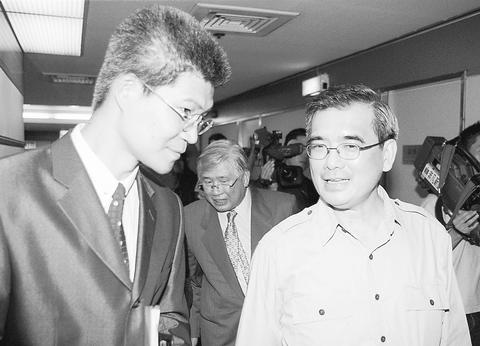Despite the controversial move, Lai Kuo-chou (
In addition, Hu Yuan-hui (
The management reshuffle took place yesterday at a meeting of TTV's shareholders. Lai and Hu both represent TTV's biggest stockholder, the Bank of Taiwan (

PHOTO: TANG CHUNG-YING, LIBERTY TIMES
Observers have long seen Lai's appointment as President Chen Shui-bian's (
"My experience in media management and my educational background in mass communications are factors that qualify me as a candidate," Lai said. "It has nothing to do with any political figures that I am associated with. After all, TTV is a publicly owned enterprise."
In addition, Lai said that TTV's shareholders from state-run banks had asked him to consider the position, not top officials from the new government.
But the Association of Taiwan Journalists (台灣新聞記者協會) has a different take on the situation.
In a statement released yesterday, the association criticized Lai's appointment and the new government's personnel arrangements, saying media autonomy had been sacrificed to satisfy Chen's political interests.
"As the former opposition party, the DPP argued that the government, political parties and the military should not interfere with the management and personnel structures of the three terrestrial TV stations," the association said.
"Lai's appointment now has nullified the new government's political ideals and promises."
Speaking to the issue of media reforms, Hu, TTV's new president, told reporters yesterday that he was determined to improve the station's professionalism while in office.
"In terms of media reforms, if TTV can achieve the goal of enhancing its professionalism, it can reclaim its golden days in Taiwan's television history," said Hu, who is highly regarded among his peers.
When asked whether TTV would undertake a chairmanship system or presidential system, Lai brushed aside reporters' concerns and said that corporate regulations would be followed. He did, however, add that better communications would be established within the company.
Thirteen other board members were also elected yesterday, including three standing board members. They were Lu Shih-Hsiang (
Two KMT representatives -- Secretary-General Lin Feng-chen (林豐正) and former secretary-general to the president, Huang Kun-hui (
Members of TTV's board are expected to attend a handover ceremony today.
Lai and Hu plan to use the ceremony as an opportunity to endorse an news autonomy agreement reached earlier with the station's news department.

NEXT GENERATION: The four plants in the Central Taiwan Science Park, designated Fab 25, would consist of four 1.4-nanometer wafer manufacturing plants, TSMC said Taiwan Semiconductor Manufacturing Co (TSMC, 台積電) plans to begin construction of four new plants later this year, with the aim to officially launch production of 2-nanometer semiconductor wafers by late 2028, Central Taiwan Science Park Bureau director-general Hsu Maw-shin (許茂新) said. Hsu made the announcement at an event on Friday evening celebrating the Central Taiwan Science Park’s 22nd anniversary. The second phase of the park’s expansion would commence with the initial construction of water detention ponds and other structures aimed at soil and water conservation, Hsu said. TSMC has officially leased the land, with the Central Taiwan Science Park having handed over the

AUKUS: The Australian Ambassador to the US said his country is working with the Pentagon and he is confident that submarine issues will be resolved Australian Ambassador to the US Kevin Rudd on Friday said that if Taiwan were to fall to China’s occupation, it would unleash China’s military capacities and capabilities more broadly. He also said his country is working with the Pentagon on the US Department of Defense’s review of the AUKUS submarine project and is confident that all issues raised will be resolved. Rudd, who served as Australian prime minister from 2007 to 2010 and for three months in 2013, made the remarks at the Aspen Security Forum in Colorado and stressed the longstanding US-Australia alliance and his close relationship with the US Undersecretary

‘WORLD WAR III’: Republican Representative Marjorie Taylor Greene said the aid would inflame tensions, but her amendment was rejected 421 votes against six The US House of Representatives on Friday passed the Department of Defense Appropriations Act for fiscal 2026, which includes US$500 million for Taiwan. The bill, which totals US$831.5 billion in discretionary spending, passed in a 221-209 vote. According to the bill, the funds for Taiwan would be administered by the US Defense Security Cooperation Agency and would remain available through Sept. 30, 2027, for the Taiwan Security Cooperation Initiative. The legislation authorizes the US Secretary of Defense, with the agreement of the US Secretary of State, to use the funds to assist Taiwan in procuring defense articles and services, and military training. Republican Representative

TAIWAN IS TAIWAN: US Representative Tom Tiffany said the amendment was not controversial, as ‘Taiwan is not — nor has it ever been — part of Communist China’ The US House of Representatives on Friday passed an amendment banning the US Department of Defense from creating, buying or displaying any map that shows Taiwan as part of the People’s Republic of China (PRC). The “Honest Maps” amendment was approved in a voice vote on Friday as part of the Department of Defense Appropriations Act for the 2026 fiscal year. The amendment prohibits using any funds from the act to create, buy or display maps that show Taiwan, Kinmen, Matsu, Penghu, Wuciou (烏坵), Green Island (綠島) or Orchid Island (Lanyu, 蘭嶼) as part of the PRC. The act includes US$831.5 billion in